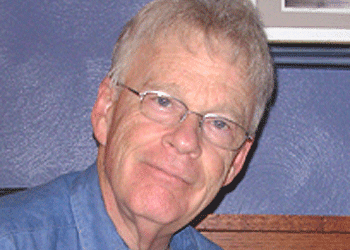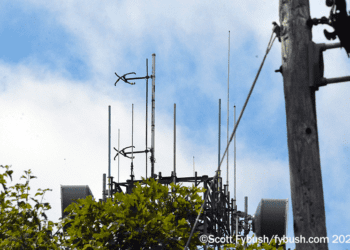In this week’s issue… WBAI picture gets cloudier after return to local programming – Silent LI AM to return – Translator fight in Maine – Canadian station owner recovers from damaging power surge
By SCOTT FYBUSH
 *Just a week or so ago, your editor had the great fun of seeing Dean Friedman in concert, doing an energetic live rendition of his 1977 hit “Ariel,” wherein the hippie heroine is first spotted in a New Jersey shopping mall, collecting donations “for the friends of the B-A-I.”
*Just a week or so ago, your editor had the great fun of seeing Dean Friedman in concert, doing an energetic live rendition of his 1977 hit “Ariel,” wherein the hippie heroine is first spotted in a New Jersey shopping mall, collecting donations “for the friends of the B-A-I.”
After the show, we chatted with Friedman for a few minutes, wondering if he was following the soap opera surrounding Ariel’s favorite radio station, WBAI (99.5 New York). He was – but little did we know that just a few days later, that soap opera would take yet another turn: WBAI’s local station board won a court order restoring their local programs to the 99.5 airwaves, replacing the “Pacifica Across America” feed that had been coming from Pacifica national headquarters in California since the national board ousted local programmers in October.
“I think it’s time to get WBAI back on the air and back to fundraising,” the Post quoted Manhattan Supreme Court Justice Melissa Crane as saying during a hearing last Wednesday in the suit pitting the local board against the national organization that actually holds the station’s license. Pacifica national had already lost one battle with the local board, being forced to continue to pay the local staff after the state determined it hadn’t properly handled the shutdown from a labor standpoint.

What happens now? As with everything in WBAI’s tangled story, it’s a mess in the making. So let’s help out Ariel (who’d now be nearly 60, has moved deeper into Bergen County, and is probably listening to WLTW or maybe WNYC) to understand what these latest developments might mean to the station she used to support back in the 1970s…
-WBAI was never silent. The return of local programming on Thursday was being billed in some quarters as “WBAI returns to the air.” That wasn’t the case, of course: the 99.5 frequency in New York never went off the air amidst the turmoil of the last month, and listeners to some of its most popular shows, such as “Democracy Now!,” never noticed any disruption at all with the switch to the Pacifica Across America schedule. What did go away when the Brooklyn studio was closed in October was a hodgepodge of block programming that was a far cry from the 1970s programming for which Ariel was collecting her “quarters in a paper cup.” And what returned Thursday morning was, from what we’ve heard, a resumption of the nonstop pledge drive that characterized a lot of WBAI’s output in recent months.
–The local WBAI wasn’t financially sustainable. That’s the argument Pacifica national made when it took over in October, saying those nonstop pledge drives simply weren’t bringing in enough money to pay WBAI’s bills, especially as the first installment of the station’s loan was coming due for its new transmitter site at 4 Times Square and the repayment of its debt to its old transmitter landlord, the Empire State Realty Trust. And if the numbers we’re hearing (audience cumes of under 80,000 listeners a week, on a class B signal reaching more than 18 million potential listeners) are accurate, it seems somewhere between unlikely and impossible that WBAI could ever bring in enough listener revenue to be sustainable in its current form.
–Who owns 99.5? The Pacifica Foundation. At least, that’s what the FCC license has said since 1960. So where the local station board might have seen a “coup,” a “seizure,” or a “takeover,” it’s equally valid to look at the October action by the national board as simply asserting its control over the license it owns, as the FCC requires. The local employees in Brooklyn may have had a voice through the local station board, but in the end, they’re still employees of the licensee, which is the national Pacifica Foundation. Except…
–Who’s controlling Pacifica national? And here’s where the ruling from Judge Crane exposed the problem that could make WBAI’s mess far messier in the months to come: she agreed with the local board’s lawyers that there were problems with the way Pacifica national conducted the vote in which it decided to lock out the local staffers and take WBAI’s programming national. Several local board members were excluded from that vote on conflict of interest grounds, a move Crane determined violated Pacifica’s bylaws.
Pacifica national says it’s appealing Crane’s ruling – but that assumes the existing leaders of Pacifica national remain in charge amidst what appears to be some turmoil at that level, too. (There was reportedly a vote to oust the current interim executive director who oversaw the WBAI takeover, but it’s not even clear to us whether or not that interim ED remains in place.)
And so WBAI muddles along, for now. Will its current local programming continue, or will some version of national take over again after the next court ruling? Will already-low listenership get lower amidst the uncertainty, or will the latest crisis rally donors to step up and better fund whatever WBAI is this week? Most critically, how will those loan payments get made – and if they don’t, will Pacifica’s national finances be affected, with whatever that might mean not only to WBAI itself but to the network’s other stations in Washington, Houston, Berkeley and Los Angeles?
If this is a victory for the local staff, it may well be a hollow one. And as ever, we’ll be watching to see what happens next as WBAI’s world continues to turn.
SPRING IS HERE…

And if you don’t have your Tower Site Calendar, now’s the time!
If you’ve been waiting for the price to come down, it’s now 30 percent off!
This year’s cover is a beauty — the 100,000-watt transmitter of the Voice Of America in Marathon, right in the heart of the Florida Keys. Both the towers and the landscape are gorgeous.
And did you see? Tower Site of the Week is back, featuring this VOA site as it faces an uncertain future.
Other months feature some of our favorite images from years past, including some Canadian stations and several stations celebrating their centennials (buy the calendar to find out which ones!).
We still have a few of our own calendars left – as well as a handful of Radio Historian Calendars – and we are still shipping regularly.
The proceeds from the calendar help sustain the reporting that we do on the broadcast industry here at Fybush Media, so your purchases matter a lot to us here – and if that matters to you, now’s the time to show that support with an order of the Tower Site Calendar. (And we have the Broadcast Historian’s Calendar for 2025, too. Why not order both?)
Visit the Fybush Media Store and place your order now for the new calendar, get a great discount on previous calendars, and check out our selection of books and videos, too!
[private]
*Congratulations are in order to Harry Harrison, the legendary NEW YORK “Morning Mayor” of WABC/WCBS-FM fame: he became one of the newest inductees into the National Radio Hall of Fame on Friday night. This year’s class also included Dr. Ruth Westheimer, whose radio career started on the old WYNY in New York; Sean “Hollywood” Hamilton, the WKTU (103.5) afternoon jock whose weekend countdown is heard nationally; Ryan Seacrest, whose KIIS (Los Angeles) morning show is actually now done from a New York studio; and Kevin and Bean from KROQ in Los Angeles, inducted just a day after Gene “Bean” Baxter’s last show before he moves from Seattle to London.
Speaking of “last show,” induction ceremony host Mike Francesa announced last week that he’s retiring again from WFAN (101.9/660) at the end of the year, this time apparently for good. Even after leaving WFAN’s afternoon slot, Francesa will stay under contract to Entercom, making contributions to its Radio.com streaming service.
*In Mineola, Cantico Nuevo Ministry might be a step closer to getting WTHE (1520) back on the air, almost a year after nearly losing its chance to buy the station from Universal Broadcasting of New York. After going silent January 25, 2018, the one-year clock was ticking on WTHE’s return in January 2019 – just as the FCC closed up shop during the government shutdown.

Unable to use its licensed site, where rival broadcaster WIN Radio Broadcasting had taken over the lease, Universal put WTHE back on the air from a longwire antenna at a different site, filing an STA request that the FCC didn’t process until after the shutdown had ended. That, in turn, triggered a petition from WIN opposing the grant of the STA, arguing that the WTHE license should have been canceled during the shutdown when the one-year deadline passed.
The FCC finally weighed in last week, ruling against WIN’s argument (since the FCC was shut down), but also assessing a $5,000 penalty against Universal in a consent decree resolving allegations of unauthorized operation from the longwire. (The consent decree doesn’t address Universal’s allegation that WIN misrepresented itself as the licensee of WTHE in order to assume the lease at the licensed site.)
In any event, Cantico Nuevo can now proceed with its $200,000 purchase of the WTHE license, with the clock once again ticking toward Feb. 5, 2020, the new one-year deadline to return the signal to the air.
(Meanwhile, Cantico affiliate RCN Ministry is facing a challenge to its proposed acquisition of WLIX-LP 94.7 in Ridge; a petition from REC Networks claims that RCN Ministry isn’t established as a nonprofit, is too closely tied to the rest of Cantico Nuevo, and that there are inconsistencies with the way WLIX-LP had been operating under its existing licensee.)
*At the other end of Long Island, “the Wiseman” is back on the morning airwaves, at least if you’re in the part of Suffolk County that can hear JVC Media’s “Oldies 98.1,” the translator fed by the HD2 of WPTY (105.3). Bill Wise started doing mornings at JVC last week, two months after losing his morning gig at Connoisseur’s WHLI (1100)/WALK (1370). For a third time, the Wiseman’s move to mornings displaces colleague Paul Richards – it happened at WBZO (103.1) when Wise was PD there, then at WHLI, and now Richards moves to weekends on Oldies 98.1 to make room for the Wiseman.
In Watertown, Bill Tinsley is the new morning man at Stephens Media Group’s WTNY (790), returning to the airwaves after seven years of retirement. Like WTNY’s former morning man, Alan Walts, Tinsley has a long Watertown broadcast history; he was on WATN (1240) in the late 1970s and early 1980s, then spent more than a quarter-century with public broadcaster WNPE (later WPBS-TV) before leaving in 2012 to run a restaurant.
Here in Rochester, Brianna Sloth goes by “Breezy” on the air – and she’s got a nice new gig. After starting as an intern just two years ago, Sloth has moved up from promotions, traffic and part-time at Entercom’s WPXY (97.9) to co-host mornings alongside Corey James. “Breezy” had been doing the “#TeamPXY” morning show on a temporary basis for the last few months, ever since former morning co-host Whitney Young quit in a pay dispute over the summer.
And in Buffalo, the annual Variety Kids Telethon is a big deal locally, which is why it was a big deal last week when the show’s organizers announced it’s moving from longtime home WKBW-TV (Channel 7). When the Variety Club next holds the event on Feb. 29 and March 1, it will be split between two new broadcast homes: WGRZ (Channel 2) will run five hours on Saturday night, followed by a 10 AM – 9 PM marathon on Sunday on independent WBBZ (Channel 67). The telethon first aired in 1962 on channel 2, but has been on channel 7 for most of the years since.
 *A station sale in VERMONT has us wondering about the state of a never-consummated deal that’s been lingering in the Green Mountain state: Ken Squier filed last week to sell the Rutland half of his “101 the One” AC simulcast, WEXP (101.5 Brandon), to Music Guild International, Inc.
*A station sale in VERMONT has us wondering about the state of a never-consummated deal that’s been lingering in the Green Mountain state: Ken Squier filed last week to sell the Rutland half of his “101 the One” AC simulcast, WEXP (101.5 Brandon), to Music Guild International, Inc.
Doing business as Woodchuck Radio, LLC, Squier paid $450,000 for WEXP back in 2012, combining it with WCVT (101.7 Stowe) to cover most of central Vermont with the new “One” format. Now he’s selling WEXP for $275,000, to the Music Guild International, Inc. nonprofit. That’s the group behind the WBKM streaming service out of Burlington, which also was heard for a while via an LMA of 107.1 across the lake in Plattsburgh a few years ago. Music Guild takes over under an LMA ahead of the purchase – and we’re still wondering if the announced sale of the rest of Squier’s Vermont stations to GM Steve Cormier, more than two years ago now, will ever find its way in front of the FCC. (That group still includes the WCVT half of “the One,” as best we can tell.
*In southern MAINE, there’s a conflict brewing between a newly-moved translator and a long-established full-power station. The translator, MaineInvests’ W292FZ (106.3 Gardiner), signed on recently from the WPFO (Channel 23) tower on Oak Hill – a site that happens to “see” quite well down toward Portland, where Binnie Media’s WHXR (106.3 Scarborough) was on the frequency first.
Using the FCC’s new translator interference rules, Binnie filed a complaint last week against MaineInvests, supplying nine interference reports from within the 45 dBu contour of its “106.3 the Bone,” where listeners say they’re having trouble hearing the Binnie station due to new interference from the translator relaying oldies WJYE (1280 Gardiner). Will the translator have to go dark – or will it find a new location or frequency?
*From MASSACHUSETTS, we’re sorry to report the death of Rick Kenadek, one of the contract engineers who kept so many stations on the air over the years. Kenadek’s clients included WESO/WQVR in Southbridge and Gois Communications, among others. He died Nov. 6, at 68.
In Boston, Ed Perry beat the FCC one-year deadline to get WMEX (1510 Quincy) back on the air; it returned to the airwaves last week in its new downsized form, diplexed on the 1260 site in Quincy with 10 kW by day, dropping down to just 100 watts at night. For now, it’s simulcasting Perry’s WATD (95.9 Marshfield).
And “Power 96.9” didn’t last long on the HD2 of Beasley’s WBQT (96.9 Boston); the hip-hop format is now “the Vibe,” apparently the result of a cease-and-desist from WNNW (800 Lawrence), which has been “Power” for a long time now.
*In CONNECTICUT, the former Cumulus stations have completed their move out of downtown Bridgeport. Late last week, WICC (600) joined sister station WEBE (107.9) over in Milford, where they’re settling in with their new Connoisseur clustermates at the existing home of WEZN (99.9), WPLR (99.1) and WFOX (95.9).
 *In PENNSYLVANIA, the addition of new morning man Chris Stigall to Salem’s WNTP (990 Philadelphia) came with a new brand, too: the talk station has joined most of the rest of its format cousins within Salem, becoming “990 the Answer.”
*In PENNSYLVANIA, the addition of new morning man Chris Stigall to Salem’s WNTP (990 Philadelphia) came with a new brand, too: the talk station has joined most of the rest of its format cousins within Salem, becoming “990 the Answer.”
*In CANADA, the week’s most interesting story comes from up north on Manitoulin Island in Lake Huron, where CHAW (Great Lakes Country 103.3) and CFRM (100.7, “Hits 100”) were both knocked off the air October 30 by a power surge that followed a car crashing into a power pole near their transmitter site.
Owner Craig Timmermans told the Manitoulin Expositor that the surge actually set one of the transmitters on fire, causing massive damage at the McLean’s Mountain transmitter site. Stations in Sturgeon Falls and Sudbury came through with loaner transmitters to get both stations back on the air at reduced power while Timmermans works to restore the stations’ signals on a more permanent basis.
 *Out along the Cote-Nord in far eastern Quebec, CFTH (97.7 Harrington Harbour) and its transmitters CFTH-2 (98.5 Mutton Bay/La Tabatiere) and CFTH-3 (89.3 Kegaska) are no more.
*Out along the Cote-Nord in far eastern Quebec, CFTH (97.7 Harrington Harbour) and its transmitters CFTH-2 (98.5 Mutton Bay/La Tabatiere) and CFTH-3 (89.3 Kegaska) are no more.
Canadian Radio News reports licensee Radio Communautaire de Harrington Harbour returned the station’s license to the CRTC; it’s not clear why the community station has folded.
[/private]












